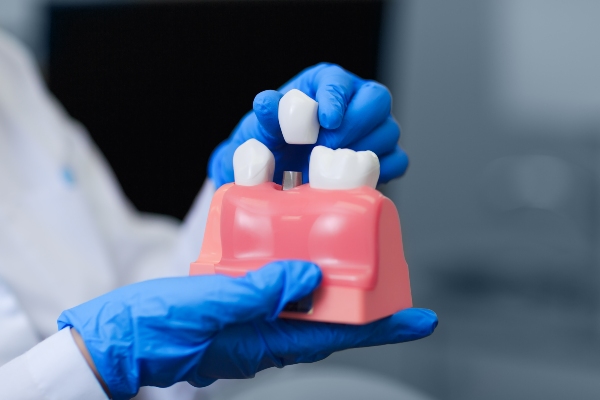Ask a Periodontist – How Can Gum Disease Harm Your Teeth and Jawbone?

A periodontist is a dentist who focuses primarily on conditions affecting the tissues surrounding the teeth, especially the gums. Gum disease can spread and affect other areas of the mouth, including the teeth and even the jawbone. If allowed to progress without treatment, it can cause tooth loss and other serious complications.
Regular flossing, brushing, and dental cleanings can help prevent gum disease from occurring in the first place. However, once it develops, it may require treatment by a periodontist.
What causes gum disease?
Gum disease begins when plaque on the teeth hardens along the gum line. Brushing and flossing are fairly effective at removing plaque before it hardens into tartar. However, once tartar has formed, it becomes more difficult to remove because of its consistency and location.
Tartar starts to irritate the gum tissue surrounding the teeth. The irritated tissue starts to pull away, forming spaces or gaps called pockets to form between the gums and teeth. The pockets provide a place for bacteria to grow, causing an infection of the gum tissue. As the pockets of bacteria become deeper, the infection can start to affect the jawbone.
Gum disease progresses through stages. The first stage is gingivitis, which can cause the gums to bleed easily and become swollen and red. Gingivitis causes no irreversible damage and can be treated with proper oral hygiene. However, the symptoms can be mild to nonexistent, allowing the disease to progress to a point where more advanced treatment by a periodontist is necessary.
How does gum disease affect the teeth and jaw?
Because all the structures of the mouth are connected, periodontal disease does not remain confined to the gums. Here are some of the effects it can have on the teeth and jaw.
Dental pain
In the early stages, the patient may not experience any symptoms of gum disease and remain unaware that treatment is needed. However, as the disease progresses, it can cause pain in the teeth, especially when biting or chewing.
Loose teeth
The gums help to hold the teeth in place within the mouth. As gum disease progresses, the teeth may begin to loosen or separate. This can affect the patient's bite, making eating and chewing more difficult.
Jawbone deterioration
As the bacterial infection extends deeper, it can start to attack the jawbone itself. The jawbone becomes weaker as a result and eventually starts to break down.
Tooth loss
The teeth are firmly rooted in the jaw, but as the bone becomes weaker, it is no longer able to provide adequate support. Eventually, the jaw may deteriorate to the point that it can no longer hold the teeth in place. Tooth loss can occur as a result.
Conclusion
As periodontal disease progresses, it extends beyond the gums to affect the teeth and jaws. With advanced gum disease, a periodontist may have to resort to more advanced treatment methods. It is not always possible to save the patient's teeth if the gum disease is severe. Therefore, it is preferable to start treatment in the early stages or prevent it altogether.
Request an appointment here: https://www.torreyhillsperio.com or call Torrey Hills Periodontal Group at (858) 925-1188 for an appointment in our San Diego office.
Check out what others are saying about our services on Yelp: Periodontist in San Diego, CA.
Recent Posts
People who are seeking healthy gums but are dealing with challenges with gingivitis can see an expert periodontist, a dental professional who has studied the structures that support the teeth. These include the gums, the jawbone itself, and the ligaments that help hold the teeth in place.Periodontists are trained dentists who focus their attention on…
Wondering what the difference is between a regular dental cleaning procedure and a scaling and root planing procedure? Keeping gum disease at bay is important for all dental patients. Periodontists are dental specialists who focus on preventing, diagnosing and treating gum disease.Thinking about your upcoming scaling and root planing procedure? Periodontists are dental specialists who…
Pinhole gum surgery is a painless, non-invasive way of reversing gum recession. It is a far better alternative than the traditional option: Gum graft surgery. While gum surgery often requires multiple sessions in the dentist’s chair, pinhole periodontal surgery only needs one. There are many other reasons to choose pinhole surgery over a gum graft.…
A socket preservation graft can help speed the healing process after a tooth extraction. However, it is important to take some steps to help aid the healing process. Keeping the area clean will help you avoid an infection. You will also want to limit your diet in the first several days. It is a good…


